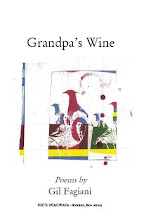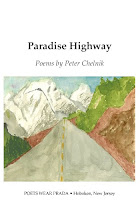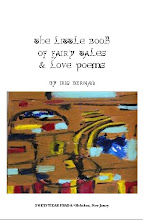
George HeldPAYDAY LOANS By Jee Leong Koh 32 pp. $10. Poets Wear Prada, Hoboken, 2007 | |
| |
What are the odds that a gay Singaporean would or could publish a book of sonnets inspired by Paul Goodman (1911-72)? In Goodman's day, nil; in 2007, low. Yet for its debut chapbook, Poets Wear Prada has produced this beautifully designed and printed collection of thirty sonnets, one for every day of April, presumably 2005. Each poem bears the date as its title. Thus the first poem is "April 1, Friday," and in it the speaker asks "Mr. Certain Death" to "lend me thirty," with the promise, "You'll get them back on my payday." This is the payday loan that gives the book its title. Note that Koh uses "them" to refer to "thirty," an example of his sometimes unidiomatic English. But these slips don't detract from his fluency with the sonnet. He works all kinds of variations within its strict confines, to which he adheres in most cases. Moreover, he writes alternately in the Italian form, which allows less freedom in its rhyme scheme than the English form, in which he writes the other half of the time. He even writes a sonnet with an inverted rhyme scheme, and he has fun with comic rhymes. Thus "April 1, Friday" ends with these rhyme words: "pissed," "mall," "irrational," and "subsist." In "April 16, Saturday" Koh uses a single rhyme for the first thirteen lines and then breaks the pattern with the onomatopoeic word "crack," enforcing the breach. I mention only some of Koh's play with the sonnet, to suggest his versatility and the degree to which the pleasures of his book are formal. (The cover bears a firmly ruled calendar for April 2005.) Next to form, Koh's obsession is sex, a subject that informs his better poems here. Arguably the best is "April 13, Wednesday," which the government of Singapore banned from being read at a gay-pride celebration there. The poem begins: Come on straight boy, and make gay love with me. These lines recall the rhetorical strategies of John Donne's peoms addressed to his (women) lovers, sly attempts to persuade his listener to enter into forbidden intimacy. Like Donne and other major poets, particularly sonnet writers, Koh exploits the value of monosyllables: these four lines contain 40 syllables, 38 in monosyllabic words. Moreover, except for the necessary adjective "straight," these lines eschew modifiers. Koh's skill in a second language puts to shame many contemporary poets who are native speakers of English and who seem addicted to modification. "April 13, Wednesday," is a perfect sonnet in the sense it fulfills itself in exactly fourteen lines. It moves from the charming opening quatrain through a second which asks the question to disparage heterosexual coupling and a third that argues for the superiority of performance between same-sex lovers, to the sensational closing couplet: "What have you got to lose? Leap, acrobat!/ You can always fall back on pussycat." The questions in the second quatrain recall Shakespeare, whose sonnets contain much interrogation, and whose other strategies and tones Koh's work borrows from. Other mentors are more contemporary and some are gay, including Goodman, a line from one of whose sonnets Koh uses to begin "April 20, Wednesday," and Frank O'Hara, to whose Lunch Poems Koh alludes in "April 19, Tuesday," which begins, "This is not a lunch poem. It's an after/ lunch poem. I can write this coz [sic] I'm jobless." By the end of this riff on an O'Hara poem, the speaker takes a job offer. May be he will soon be able to pay off his loan to Mr. Certain Death, but that theme occurs only sporadically in the Payday Loans, despite the title. Speaking of titles, I wonder that none of the famous poets Koh heartily thanks for their help did not point out to him that giving his poems the names of days would leave them bereft if they are ever anthologized: "April 18, Monday" offers no clue about the fine erotic poem beginning "What's on tonight but lips pressed on lips." And not all the poems in the collection add to its value; maybe Koh should have chosen February. All told, however, this book refreshes our sense of what can be done in a traditional form when the poet uses his wits and has the wit of Jee Leong Koh. |




































































No comments:
Post a Comment